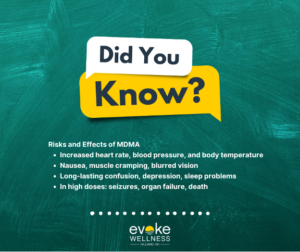Have you heard of Molly? Maybe you think it’s just another name for MDMA, also known as ecstasy or E. But Molly is far more dangerous than you might realize. In this article, you’ll get the truth about this risky drug – from what it really is to how it can damage your health. We’ll explore the science behind MDMA and look at some eye-opening statistics on overdoses and deaths. You’ll also learn about the different types of treatment available if you or someone you know needs help with addiction. We cover everything from residential and inpatient care to specialized programs for men, women, mental health issues, and more. The goal is to give you the facts so you can make informed choices. After reading, you’ll understand the truth about Molly and why it’s so hazardous.
Evoke Wellness at Hilliard Offers:
- Residential treatment program
- Individual therapy and group therapy
- Holistic healing approaches
- Intensive Outpatient program
- Counseling and behavioral therapies
- Family education and support
- Continuing care planning
- Men’s rehab program
- Women’s rehab program
- Trauma-informed, gender-responsive care
- Peer support and mentorship
- Empowerment and life skills building
If you or a loved one is considering treatment, Evoke Wellness at Hilliard invites you to contact us. Our compassionate team is ready to answer your questions, discuss your needs, and help you take the first steps toward recovery. In Hilliard, you’ll find more than just a treatment program – you’ll discover a community dedicated to your wellness and success. Together, let’s embrace the journey to recovery and the promise of a new beginning. Call us at (833) 949-1347 today or reach out online.
What Is Molly?
“Molly” is a street term for MDMA (3,4-methylenedioxy-methamphetamine), the main ingredient in the club drug ecstasy. Though some users believe “Molly” refers to a pure, powdered form of MDMA, in reality, it often contains other dangerous substances.
The Truth About “Molly”
Molly frequently contains synthetic cathinones (“bath salts”), caffeine, and other unknown compounds added by dealers. These additives greatly increase the risk of overdose, addiction, and long-term health issues. There’s no way for users to know what’s really in Molly.
Getting Help
If you or a loved one is struggling with Molly or ecstasy abuse, seek professional treatment. Evoke Wellness offers residential, inpatient, men’s/women’s rehab, and substance use disorder programs to support recovery. Their mental health specialists provide compassionate, evidence-based care.
The History of MDMA (Ecstasy)
The Birth of a Party Drug
In the early 1900s, the pharmaceutical company Merck patented MDMA as an intermediate compound. However, its psychoactive effects went unexplored for decades until the 1970s. Psychotherapists began utilizing MDMA to supplement counseling sessions due to its ability to increase empathy and emotional openness.
Rise of Rave Culture
By the 1980s, MDMA infiltrated underground rave and club scenes. Its popularity soared as a party drug, with users reporting feelings of euphoria, emotional warmth, and enhanced sensory perception. This led to the slang term “Ecstasy.”
The War on Drugs
Concerned by MDMA’s rising recreational use, the US classified it as an illegal Schedule I drug in 1985. This criminalized possession and distribution without accepted medical use. Nonetheless, black market production and smuggling operations continued supplying users worldwide.
How Molly Affects the Brain and Body
Brain Effects
Molly (MDMA) acts as a stimulant and hallucinogen by increasing serotonin, dopamine and norepinephrine activity in the brain. This can cause euphoria, emotional warmth and energy boosts. However, it also puts immense strain on serotonin-producing neurons which can lead to long-term depletion.
Physical Effects
- Increased heart rate and blood pressure
- Muscle tension
- Nausea
- Blurred vision
- Chills or sweating
Even a single use can be extremely taxing on the body. Molly use can potentially cause hyperthermia, liver or kidney failure in severe cases. The long-term effects are still being researched but may include confusion, depression and memory issues.
The Dangers and Side Effects of Molly Use
Physical Risks
- Increased body temperature, heart rate and blood pressure
- Risk of muscle cramping and teeth grinding
- Dehydration, nausea and blurred vision
Mental Effects
- Feelings of anxiety, paranoia and psychosis
- Sleep disturbances and lack of appetite
- Confusion, depression and severe panic attacks
Long-Term Dangers
- Brain damage impacting memory and decision-making
- Kidney and cardiovascular problems
- Addiction and withdrawal symptoms upon stopping use
Molly, the street name for ecstasy or MDMA, is an illegal synthetic drug. While perceived as relatively safe, it poses serious dangers. Short-term effects range from physical issues like overheating to frightening psychological disturbances. Continued use can lead to organ damage, mental health issues and addiction. Seek help from qualified treatment programs to overcome problematic molly abuse.
Who Is Using Molly?
Younger Generations & Party Scene
Molly or ecstasy is most popular among younger adults and teens. The party, rave and music festival scenes are hotspots where this synthetic drug gets frequently abused. The perceived euphoria and heightened sensory experience draw many users.
College Students
Colleges see high rates of Molly use, with studies showing around 1 in 9 full-time students have tried it. The high-pressure environment and desire to escape anxiety/stress contribute to this.
Lower Income Groups
Lower socioeconomic statuses correlate with higher ecstasy use. Factors like limited education, unstable living conditions and lack of opportunity create fertile ground for substance abuse.
Getting Treatment for Molly Addiction
If you or someone close is struggling with molly (MDMA) addiction, it’s crucial to seek professional help. Evoke Wellness offers comprehensive treatment programs tailored to individual needs.
Residential Treatment
- Safe, structured living environment
- 24/7 medical monitoring and support
- Individual and group therapy
- Holistic healing approaches
Intensive Outpatient
- Flexible day treatment schedules
- Counseling and behavioral therapies
- Family education and support
- Continuing care planning
Gender-Specific Programs
- Men’s and women’s specialized tracks
- Trauma-informed, gender-responsive care
- Peer support and mentorship
- Empowerment and life skills building
No matter how hopeless addiction feels, recovery is possible with the right care team. Reach out to Evoke Wellness today to begin your healing journey.
Molly Drug Addiction FAQs
What is “molly”?
- “Molly” is a street name for MDMA (3,4-methylenedioxymethamphetamine), a synthetic drug that acts as a stimulant and hallucinogen.
- It produces feelings of euphoria, emotional warmth, and distortions in sensory perception.
How addictive is molly?
While not physically addictive like opioids, molly can lead to psychological dependence and compulsive abuse. Frequent use builds tolerance, requiring higher doses to achieve the same effects and increasing the risk of addiction.
What are signs of molly addiction?
- Taking molly more often or in higher amounts than intended
- Inability to cut down despite wanting to
- Spending excessive money, time obtaining/using molly
- Continuing use despite negative consequences
How is molly addiction treated?
Evidence-based treatments include:
- Therapy (CBT, motivational interviewing)
- Support groups
- Residential or outpatient rehab programs
- Treating co-occurring mental health issues
The key is comprehensive, personalized care addressing all needs for lasting recovery.
Conclusion
You now understand the risks associated with using Molly. While it may seem fun and harmless, this illegal drug can have life-altering consequences. Consider getting help through rehabilitation if you or someone you know is struggling with addiction. Programs like residential treatment, intensive inpatient care, gender-specific rehab, dual diagnosis treatment, and more can provide the support needed to get sober. There are always alternatives to substance use. Your health and wellbeing are too important to gamble. You have so much potential–don’t let drugs steal that away. Make the choice to live substance-free and embrace the bright future ahead.
Begin Your Journey with Evoke Wellness at Hilliard
If you or a loved one is considering treatment, Evoke Wellness at Hilliard invites you to contact us. Our compassionate team is ready to answer your questions, discuss your needs, and help you take the first steps toward recovery. In Hilliard, you’ll find more than just a treatment program – you’ll discover a community dedicated to your wellness and success. Together, let’s embrace the journey to recovery and the promise of a new beginning. Call us at (833) 949-1347 today or reach out online.



